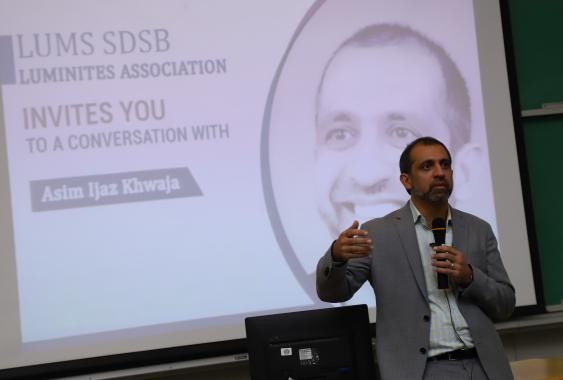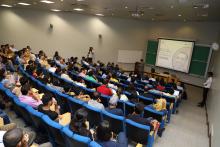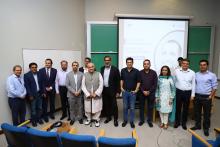
SDSB Luminites Association welcomed Asim Ijaz Khwaja, Professor of International Finance and Development at the Harvard Kennedy School, and co-founder of the Center for Economic Research in Pakistan (CERP) at SDSB LUMS on 22nd August 2019, Thursday. Asim, as the economist shared his views on Development Economics, Governance and Tax Reforms. The event attracted over 150 attendees including Syed Babar Ali who graced the event with his kind presence as well as other distinguished guests, industry practitioners, top CEOs and eminent members from the media fraternity.
Majid Munir, President of the SDSB Luminites Association introduced the Pakistani-American research scholar to the audience. Asim has been published in leading economics journals, such as the American Economic Review and the Quarterly Journal of Economics, and has received coverage in numerous media outlets, such as The Economist, The New York Times, The Washington Post, The International Herald Tribune, Al-Jazeera, BBC, and CNN. His recent work ranges from understanding market failures in emerging financial markets to examining the private education market in low-income countries. He was selected as a Carnegie Scholar in 2009 to pursue research on how religious institutions impact individual beliefs.
Speaking about opportunities, the MIT and Harvard alumni enlightened the audience about his time in Pakistan during the early days of his career and how access to data had been critical to his professional endeavours. Stressing on the need to define friction in order to improve productivity, Asim Khwaja addressed how micro solutions can be the starting point for macro-economic challenges.
Asim also talked about revolutionising the conventional thought process that blames the system for major fall outs and the current economic turmoil, and instead emphasised on resolving what is within one’s control – micro solutions for macro-economic challenges.
‘We need to constantly adapt and solve things within our control. It’s a virtuous cycle. Everyone will have to play his or her role’, Khwaja commented. He affirmed that it’s the trust equilibrium between the State and its citizens that shapes and nurtures economies. Imbalance leads to problems like the taxation crisis that the country suffers at hand. He further said that the conundrum of complex and incomprehensible feuds discussed on national talk shows can never solve macro issues. He suggested that a thorough understanding of learning centres, influence of incentives on performances, comprehensive research and training, the right utilisation of capital and labour and the realisation of efforts on every level is what will eventually play its part to bring ‘economic prosperity’.



